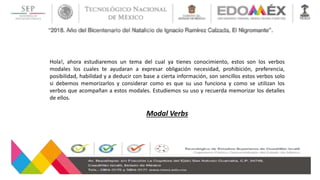
Modal verbs
- 1. Hola!, ahora estudiaremos un tema del cual ya tienes conocimiento, estos son los verbos modales los cuales te ayudaran a expresar obligación necesidad, prohibición, preferencia, posibilidad, habilidad y a deducir con base a cierta información, son sencillos estos verbos solo si debemos memorizarlos y considerar como es que su uso funciona y como se utilizan los verbos que acompañan a estos modales. Estudiemos su uso y recuerda memorizar los detalles de ellos. Modal Verbs
- 2. Must –have to – need Expressing obligation and prohibition • must+ base form expresses personal obligation in the present or future Ex: I must finish this by tonight. (=I say so) • have to + base form expresses external obligation in the present or future Ex:You have to drive on the left when you’re in England (=It’s the law) • mustn’t+ base form expresses prohibition in the present or future Ex:You mustn’t park here. (You aren’t allowed to) • had to + base form expresses obligation in the past. Ex:When I was at school I had to wake up at 7 o´clock every morning
- 3. Expressing Necessity and Absence • need to + base form expresses necessity in the present or future Ex: I need to know how many people will be at the party • don’t have to/don’t need to / needn’t + base form expresses absence of necessity in the present or future Ex: You don’t have to call us again. (=It isn’t necessary) Ex: She doesn’t need to send her CV again You needn’t worry. Everything is under control • needed to + base form expresses necessity in the past. Ex: We needed to buy some more soft drinks, so we went to the supermarket • didn’t have to / didn’t need to + base form expresses ansence of necessity in the past (something wasn’t necessary and may or may not have been done Ex: I didn’t have to / didn’t need to pick up the kids from school
- 4. had better + base form is used to give strong advice. It often expresses threat or warning and it is stronger than should/ought to . It referes to the present or future, not the past. It’s negative form is had better not. In spoken English the short form is commonly used (I’d better, you’d better, etc.) Ex: You’d better ask a doctor about it would rather + base form is used to express preference about the present or future. It is usually followed by tan. Its negative form is would rather not. In spoken English the short form is commonly used (I’d rather, you’d rather, etc. ). Ex: I’d rather listen to pop music than jazz Expressing possibility May/ might/ could + base form expresses possibility in the present or future Ex: He could /may/might be at home now May not/might not + base form express the possibility that something will not happen in the present or future. Ex: We may not /might not go to the party tonight. Making Deductions Must + base form express certainly that something is true Ex: My parents must be at work now. Can’t + base form expresses belief that something is impossible Ex: You can’t be serious
- 5. Ahora tuviste la oportunidad de revisar los verbos modales, recuerda que los modales son verbos o expresiones que expresan algo en especifico como los que acabas de ver, los cuales pueden expresar obligación, habilidad, necesidad, etc., debes recordar que en cuestión gramatical es muy importante recordar que los verbos que acompañan estos modales están siempre en su forma simple o como se les llama en inglés base form, nunca se modificara, en realidad solo debes recordar a lo que se refiere el verbo modal porque la gramática es muy sencilla de recordar Esperamos que este nuevo tema no se te haya complicado, nuevamente te recordamos que esto es un repaso de estos verbos modales que con anterioridad has visto en cursos pasados encontraras un ejercicio de este tema asignado como tarea asignada. Suerte para tu próxima lección y recuerda que cualquier duda o complicación que llegaras a tener, recurre al profesor a cargo del curso quien con gusto te apoyará.
- 6. TECNOLÓGICO DE ESTUDIOS SUPERIORES DE CUAUTITLAN IZCALLI (TESCI)